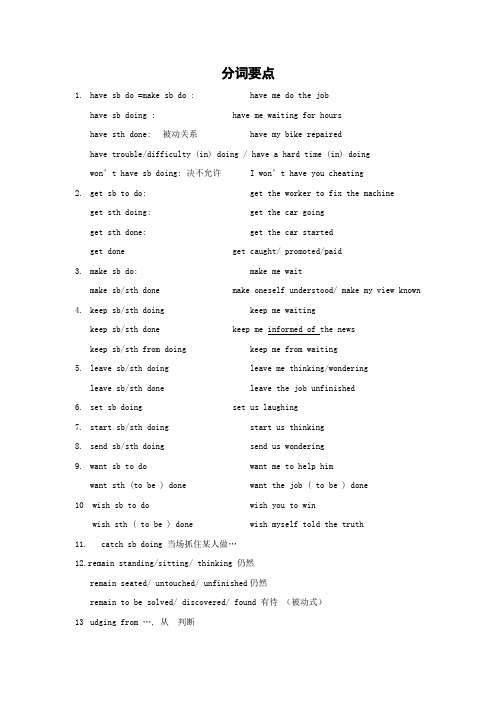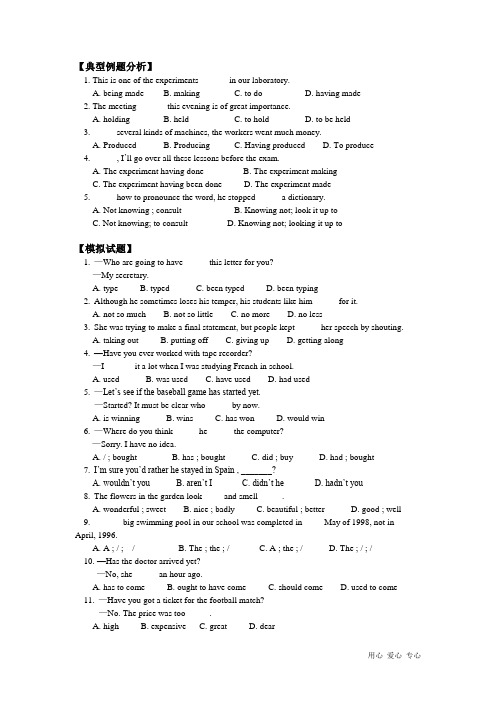高二英语人教版专项复习3动名词分词
- 格式:doc
- 大小:82.00 KB
- 文档页数:7

分词要点1.have sb do =make sb do : have me do the jobhave sb doing : have me waiting for hourshave sth done: 被动关系have my bike repairedhave trouble/difficulty (in) doing / have a hard time (in) doingwon’t have sb doing: 决不允许I won’t have you cheating2.get sb to do: get the worker to fix the machineget sth doing: get the car goingget sth done: get the car startedget done get caught/ promoted/paid3.make sb do: make me waitmake sb/sth done make oneself understood/ make my view known 4.keep sb/sth doing keep me waitingkeep sb/sth done keep me informed of the newskeep sb/sth from doing keep me from waiting5.leave sb/sth doing leave me thinking/wonderingleave sb/sth done leave the job unfinished6.set sb doing set us laughing7.start sb/sth doing start us thinking8.send sb/sth doing send us wondering9.want sb to do want me to help himwant sth (to be ) done want the job ( to be ) done10 wish sb to do wish you to winwish sth ( to be ) done wish myself told the truth11. catch sb doing 当场抓住某人做…12.remain standing/sitting/ thinking 仍然remain seated/ untouched/ unfinished仍然remain to be solved/ discovered/ found 有待(被动式)13udging from …, 从判断Speaking of/ Talking of /Thinking of….,谈及Considering….,鉴于/考虑到Generally speaking/ 大体而言Frankly speaking坦白而言14with结构,He came in, with a girl standing beside him., with his hands tied., with a gun in his hand., gun in hand(没有a,没有one’s), with no shoes on., with the door open.(with the door closed/ shut)With a lot of work to do, I stayed at the company.15The accident that happened yesterday was horrible. 正确(不能用happening做定语,ing分词表示正在进行)The accident happened yesterday was horrible.错误,因为有两个谓语There is a car coming.16This is the best film ever made. ( 不用having been made)注意:having done/ having been done/not having done/ not having been done 不能做定语,只能做状语!!!!17I went home, only to see my house broken into. 我到家却发现房子被人闯入过了。

【典型例题分析】1. This is one of the experiments ______ in our laboratory.A. being madeB. makingC. to doD. having made2. The meeting ______ this evening is of great importance.A. holdingB. heldC. to holdD. to be held3. _____ several kinds of machines, the workers went much money.A. ProducedB. ProducingC. Having producedD. To produce4. _____ , I’ll go over all these lessons before the exam.A. The experiment having doneB. The experiment makingC. The experiment having been doneD. The experiment made5. _____ how to pronounce the word, he stopped _____ a dictionary.A. Not knowing ; consultB. Knowing not; look it up toC. Not knowing; to consultD. Knowing not; looking it up to【模拟试题】1.—Who are going to have _____ this letter for you?—My secretary.A. typeB. typedC. been typedD. been typing2.Although he sometimes loses his temper, his students like him _____ for it.A. not so muchB. not so littleC. no moreD. no less3.She was trying to make a final statement, but people kept _____ her speech by shouting.A. taking outB. putting offC. giving upD. getting along4.—Have you ever worked with tape recorder?—I ______ it a lot when I was studying French in school.A. usedB. was usedC. have usedD. had used5.—Let’s see if the baseball game has started yet.—Started? It must be clear who _____ by now.A. is winningB. winsC. has wonD. would win6.—Where do you think _____ he _____ the computer?—Sorry. I have no idea.A. / ; boughtB. has ; boughtC. did ; buyD. had ; bought7.I’m sure you’d rather he stayed in Spain , _______?A. wouldn’t youB. aren’t IC. didn’t heD. hadn’t you8.The flowers in the garden look ____ and smell _____.A. wonderful ; sweetB. nice ; badlyC. beautiful ; betterD. good ; well9._____ big swimming pool in our school was completed in ____ May of 1998, not in ____ April, 1996.A. A ; / ; /B. The ; the ; /C. A ; the ; /D. The ; / ; /10. —Has the doctor arrived yet?—No, she _____ an hour ago.A. has to comeB. ought to have comeC. should comeD. used to come11.—Have you got a ticket for the football match?—No. The price was too_____ .A. highB. expensiveC. greatD. dear12.—How often do you go to the library?—_______.A. In two daysB. Every few daysC. Each third dayD. Every a few days13.—Oh, no! It’s a quarter to six already and I’ll miss 6 o’clock train.—______. That clock is half an hour fast. You have enough time to catch itA. Hurry upB. Don’t make a jokeC. Take careD. Don’t worry14.—With your help I’ve won the girl’s 100 meters. Thank you.—______.A. With pleasureB. The same to youC. It’s a pleasureD. That’s right15.What the teacher and the students want to say _____ either of the countries _____ beautiful.A. are ; areB. is ; isC. are ; isD. is ; are16.I’ll go to the market with my father next week. We’re going to buy some _____ glasses.A. lovely old FrenchB. old lovely FrenchC. French old lovelyD. old French lovely17.The soldiers bedded down in a small old house near the river. Bedded down means______.A. were tired outB. were seriously illC. settled for the nightD. had a rest18.—What do you think of the contest?—I was told that the English Speech Contest ______ successfully last night.A. went alongB. went downC. went offD. went on19.You have made a few mistakes in your composition but _____ you have done well.A. first of allB. on the wholeC. on the other handD. generally speaking20.______ we had been looking forward to.A.Then came the hourB.Before Rose the new teacher stoodC.When the hour cameD.After Kate stands the new teacher21.—What are you doing, Jim?—I’m ______ telephone to my friend in London.A. on theB. in theC. on aD. for a22.______ Mary ______ Rose know nothing about the matter, for they didn’t come to the meeting yesterday.A. Either ; orB. Both ; andC. Neither ; norD. Not only ; but23.—_____ I return the dictionary within three days.?—No, you ______. You ______ it for five days.A.May ; needn’t ; can borrowB.Can ; mustn’t ; would haveC.Must ; don’t have to ; can keepD.Shall ; can’t ; should read24.My teacher often said in class, “ Let’s _______ in English.”A. sayB. talkC. speakingD. tell25.______ fun it is to jump into a pool or go swimming in summer!A. What aB. HowC. How aD. What26.The driver kept ______ about the accident ____ lose his job.A. still ; in order to notB. quiet ; not so as toC. silent ; so as not toD. calm ; in order not to27.—I’d like to invite you to a concert this evening.—Thank you, but _____ I’ll be free I’m not sure at the moment.A. whileB. ifC. whenD. whether28.Which is wrong?A.You must have studied English for years, haven’t you?B.Pass me a book, don’t you?C.He must have arrived yesterday, didn’t he?D.Everybody is here, aren’t they?29.—Mum, I’m going to visit my aunt. What about a week?—A week is too long. Try to be back in a of days.A. numberB. dozenC. coupleD. score30.The hero said, “ One should love _____ country!”A. herB. itsC. theirD. one’s31.—What’s the matter with you?—____ the window, my finger was cut unexpectedly.A. CleaningB. To cleanC. While cleaningD. While I was cleaning32.____ my finishing reading the magazine, you can have it _____.A. On ; immediatelyB. At ; quicklyC. For ; fortunatelyD. With ; likely33.I kept looking at the man, wondering _______.A.whether I have seen him beforeB.whether I had seen him beforeC.that I had seen him beforeD.when I had seen him before34.______, when he was already ______, he started to learn English.A. In the 1980 ; thirtiesB. In the 1980’s ; in his thirtiesC. In the 1990 ; in thirtiesD. In 1990’s ; in the thirties35.Hold on a minute! Mr. Red is coming. He is in the next room. The underlined part above means:A. Don’t hang up the phone .B. Put up the phone .C. Take down the phone .D. Hand in the telephone .36.—Who knocked at the door?—I’ve no idea. I just pretended nobody was at home, so I didn’t ask who ____ was.A. heB. thatC. sheD. it37. Apples are usually sold by _____ weight, and eggs are sometimes sold by ____ dozen .A. the ; theB. / ; aC. / ; theD. the ; a38.I _____ violin lessons every two weeks, but I think I’ll make it every week from next month.A. am havingB. have hadC. haveD. have been having39.It’s too late to go out now. _____ it’s starting to rain.A. BesidesB. MeanwhileC. HoweverD. Anyhow40.If you listen to me, you _____ have some candies, honey.A. shallB. mayC. willD. must41.—I always look out when crossing the street.—You’re right. You cannot too _____.A. nervousB. carefulC. hurriedD. careless42.Is it in that factory _____ this type of cars are produced?A. whichB. whereC. thatD. /43.—Do you have anything more _____, sir?—No. You can have a rest or do something else.A. typingB. to be typedC. typedD. to type44. You should think _____ yourself instead of obeying orders.A. ofB. toC. byD. for45. —I’m sorry I forgot to post t he letter for you.—_____. I’ll do it myself.A. That’s OKB. Don’t worryC. Take it easyD. It’s too hard46. They have their reasons for keeping their marriage _____ secret for ____ moment.A. the ; aB. the ; theC. a ; theD. a ; a47. —I have a favor to ask you.—_______.A. Go aheadB. It’s a pleasureC. Help yourselfD. Ask, please48. In those days, the old woman _____ sit at the gate for hours, waiting for her son to return from the front.A. couldB. shouldC. mightD. would49.The dark clouds are gathering as if it _____ rain.A. willB. is going toC. wouldD. were going to50. —Is _____ finished?—Not yet. My dirty clothes are still soaking in the washing-machine.A. somethingB. anythingC. nothingD. everything答案:1. A 本题考察分词的现在进行式的被动语态。


高中英语语法动名词和分词(2)4)现在分词作状语:A)作时间状语:(While) Working in the factory, he was an advanced worker. 在工厂工作时,他是一名先进工人。
B)作原因状语:Being a League member, he is always helping others. 由于是共青团员,他经常帮助他人。
C)作方式状语,表示伴随:He stayed at home, cleaning and washing. 他呆在家里,又擦又洗。
D)作条件状语:(If) Playing all day, you will waste your valuable time. 要是整天玩,你就会浪费宝贵的时间。
E)作结果状语:He dropped the glass, breaking it into pieces. 他把杯子掉了,结果摔得粉碎。
F)作目的状语:He went swimming the other day. 几天前他去游泳了。
G)作让步状语:Though raining heavily, it cleared up very soon. 虽然雨下得很大,但不久天就晴了。
H)与逻辑主语构成独立主格:I waiting for the bus, a bird fell on my head.我等汽车时,一只鸟落到我头上。
All the tickets having been sold out, they went away disappointedly.所有的票已经卖光了,他们失望地离开了。
Time permitting, we’ll do another two exercises. 如果时间允许,我们将做另两个练习。
有时也可用with (without) +名词(代词宾格)+分词形式With the lights burning, he fell asleep. 他点着灯睡着了。

动名词和现在分词区别例子动名词,是在句子中充当名词性成分的词,比如在句子之中动名词可以充当主语,可以充当宾语,还可以是表语。
动名词和现在分词的区别性质不同:作表语的动名词与主语指同一件事,此时系动词相当于“是”,通常把主语和表语位置互换,语法和意思不变。
现在分词作表语主要用以说明主语性质,不能与主语互换位置。
作用不同:动名词修饰名词时主要表示该名词用途,现在分词修饰名词时表性质、状态或动作等。
现在分词是形容词,而动名词是名词,因此在一个句子中,凡是可以放形容词的地方,都可以放现在分词,凡是可以放名词的地方,都可以放动名词。
现在分词和动名词例子很多同学比较头疼的事情是如何区分一个同样是加了ing的名词在句子之中到底是动名词还是现在分词。
其实很简单,我们主要看它出现在句子的什么位置。
如果这个单词出现,在一个名词之前有可能他是现在分词当然同时也有可能它是动名词,但是,如果出现在句子之中名词所存在的位置,那么这个词他则肯定是动名词。
Dehydrating the body was the next step after removing organs and brain during mummification.这里的dehydrate指的是“把某样东西脱水”,“dehydrating the body 让尸体脱水是木乃伊制作过程中随取除内脏过程后的步骤。
在这里,dehydrating作主语。
而现在分词在句子之中只能充当非名词性的成分,比如定语,状语,当然也有表语。
The diminishing nodule surprised even the residential as he has previously considered it a thyroid tumour that would need operation. “diminish指的是变小,减半,在这里作为形容词说明患者有的是什么样的结节,做形容词,在句中是定语。

高考英语二轮备考:动名词和现在分词的句法功能在英语语法中,动名词和现在分词的表达形式都是动词-ing形式。
在句法功能上,二者有相似之处,即都可以在句中作表语和定语,因而初学者常常会将二者弄混。
同时,它们也有着各自专属的句法功能,而且即便是在句法功能相同的情况下,二者所表达的意义也完全不同。
对此,为大家梳理了动名词和现在分词各自的句法功能以及它们在句中作表语和定语时的区别。
一、动名词的专属句法功能(一)动名词作主语动名词作主语时往往表示一种概念、习惯或者经验,表示一般的、抽象的或习惯性的动作。
非谓语动词中的不定式也可以作主语,但不定式作主语时表示具体的、一次性的或尚未发出的动作。
例句:Singing is my hobby,and to sing on a big stage is my dream.(二)动名词作宾语常见的接动名词作宾语的动词有:admit(承认),advise(建议),suggest(建议),consider(考虑),enjoy(喜欢),imagine(想象),mind(介意),permit(允许),risk(冒险),practice(练习),escape(逃避),delay(推迟)。
常见的接动名词作宾语的动词短语有:look forward to(期待),give up(放弃),keep on(持续),put off(推迟)。
此外,动名词既可以作动词的宾语,也可以作介词的宾语。
例句:After looking at the toy for some time,he turned around and found his parents were missing.(本句中,“looking”就是作介词“after”的宾语。
)二、现在分词的专属句法功能(一)现在分词作宾语补足语现在分词可以在hear、see、notice、watch、feel、smell、look at、listen to、observe、find等表示感官和心理状态的动词以及keep、have、leave、set、send这些动词后面作宾语补足语,和宾语共同构成复合宾语。
动名词与现在分词的区别三、动名词的时态和语态动名词的时态和语态如下:主动语态、被动语态、一般式writing、being written、完成式having written、having been written其否定形式是在doing前加上not1、动名词一般式表示的动作通常是一般性动作,即不是明确地发生在过去、现在或将来的动作,或是与谓语动词所表示的动作同时发生的动作。
如:I hate talking with such people. 我讨厌与这样的人说话。
2、动名词的完成式表示的动作发生在谓语动词动作之前。
如:I don‟t remember having met him before.3、动名词的逻辑主语同时也是动名词动作的承受者,动名词用被动语态。
(1)它的一般式表示。
如:I don‟t like being laughed at in public. 在公共场合下,我不喜欢被别人嘲笑。
(2)它的完成式表示。
如:I am very pleased at your having been honored with a medal. 我很高兴你能获得这样的奖牌。
(3)在某些动词,我们常用动名词的一般式表示完成式,尽管动作发生在谓语动词动作之前,这似乎是一种强大的习惯。
如:Excuse me for being late. 我来晚了请你原谅。
I don‟t remember ever meeting somewhere. 我记不得原来在什么地方见过。
Thank you for giving us so much help. 谢谢给我们这么大的帮助。
(4)在多数情况下都避免使用动名词被动语态完成式,而用一般式代替,以免句子显得累赘,尤其是在口语中。
如:I forget once being taken (having been taken ) to the city zoo. 我曾被带到过这个动物园,可我忘了。
高中英语语法专题复习03 非谓语动词(不定式、动名词&现在分词、过去分词)非谓语动词谓语动词在句子中有三种作用:1. 表示动作的时间,tense (时)2. 表示动作的状态,aspect (体)3. 表示动作的语气,mood (气)谓语动词的“时体气”,通过动词变位实现。
例如,The rabbit ate a carrot.The rabbit is eating a carrot.The rabbit has eaten a carrot.谓语动词在句子中受到主语的限制,随之出现了时态和人称的变化,成为一种被限定了的动词,所以也被称为限定性动词(finite verb)。
与之相对的,不受主语限制的动词,称为非限定性动词(non-finite verb),也就是非谓语动词。
非谓语动词不具备表达时态和人称的作用。
例如,I like to eat carrot.I liked eating carrot.The rabbit likes minced carrot.非谓语动词有四种形式:1. 不定式 infinitive2. 动名词 gerund3. 现在分词 present participle4. 过去分词 past participle谓语动词是简单句的核心动词,非谓语动词只可能出现在其他的句子成分中。
1. 主语例:Swimming makes us hale and hearty.2. 宾语例:Janet suddenly stopped talking.3. 表语/主语补语例:Her wish is to become a doctor in the future.4. 宾语补语例:I invited him to come here.5. 定语例:Don't disturb the sleeping dog.6. 状语例:He went to the supermarket to buy a pen.不定式、动名词句子的核心动词只能由谓语动词充当,而非谓语动词可以充当句子的其他成分。
英语专题辅导:动名词和分词用法及必修三词组总结高二是高中学习的关键时期,不仅课程任务重,而且很大程度上决定着学生今后的发展方向,以及能否考入理想的大学。
有着丰富教学经验的老师,向大家传授高二各学科学习技巧,希望对高二学生掌握良好的学习方法、提高学习效率有所帮助。
以下是英语学科的主要学习方法。
人教版高二英语必修三第四单元词组总结1.无论是公汽还是火车whether buses or trains2.穿过 get through3.疯了 as mad as a door4.诗的乐园 a garden of poems5.根据…分类 be sorted by6.关于友谊和爱情的浪漫诗集romantic poetry about love and friendship7.聚集到一起 bring together8.超过其他文学的任何形式more than any other form of literature9.灵活运用 play with10.唤起,使想起 call up11.梦幻世界的奇意象curious images of a dream world12.兀立于荣光宝殿之上stand out in the hallsof glory13.遵循特殊的节奏和韵脚follow specialpatterns of rhythm and rhyme14.以他的戏剧而闻名be most famous for his plays15.使他们想起 remind them of16.一旦被出版 once published17.缺少节奏感 the absence of thyme18.在每一行末 at the end of each line19.许多杰出诗人 a great number of fine poets20.在中国最受欢迎的是英国浪漫主义诗人 Greatly loved in China are the English Romantic poets21.英年早逝 die at a very young age22.活到80岁 live to the age of 8023.通向,导致 lead to24.英国诗歌引进中国the introduction of English poetry to China25.把…翻译成汉语 translate into Chinese26.现代英语诗modern poetry in English27.不管一首诗被翻译得多好no matter how well a poem is translated28.原作的精髓something of the spirit of the original work29.用汉语表达自己的方式ways of expressing oneself in Chinese30.中西方的桥梁the bridges between the East and the West英语专题辅导:动名词和分词用法在英语中,不作句子谓语,而具有除谓语外其他语法功能的动词,叫做非谓语动词。
高二英语(人教版)专项复习3--动名词,分词一. 本周教学内容高二英语(人教版)专项复习3--动名词,分词二. 教学目标归纳总结非谓语动词中动名词和分词的用法三. 教学重、难点不定式和动名词后接宾语的区别四. 具体内容(一)动名词的几个特殊情况1. 有些动词的后面能跟动名词做宾语,有些动词能跟不定式,有些两者都可以,它们的具体含义有时还不一样。
2. 能跟动名词的动词有:avoid, consider, delay, deny, dislike, endure, enjoy, escape, forgive, finish, imagine, keep, mind, miss, pardon, prevent, resist, suggest, understand, can’t help等。
能跟不定式的动词有:decide, desire, expect, hope, mean, pretend, promise, refuse, undertake, want, wish, agree, manage能跟动名词和不定式的动词有:love, like, hate, prefer, dislike, begin, continue, intend, attempt, propose, want, need, remember, forget, regret, try, deserve, start动词后面跟动名词还是不定式,含义不相同,总的来说,表示习惯的,一般性的动作多跟动名词,一次性的具体的被动动作多跟不定式。
I like to go with you. 我想和你一块儿去。
I like reading. 我喜欢阅读。
He promised to help her. 他答应过要帮助她。
We love watching VCD. 我们喜欢看VCD。
3. remember,forget,regret后面跟动名词时,动名词表示过去的动作,后面跟不定式时,不定式表示将来的动作。
I remember meeting him in the street. 我记得在街上见过他。
I remember to write a letter to my parents. 我想起来要给我父母亲写信。
4.“stop + 动名词”表示停止动名词所表示的动作,“stop + 不定式”表示停下来做不定式所表示的动作。
Stop smoking, please. 请不要抽烟。
Let’s stop to have a rest. 咱们停下来休息一下吧。
5. 动名词和分词的区别:动名词作定语时,动名词和它所修饰的词没有逻辑上的主谓关系,而分词作定语时,分词和它所修饰的词有逻辑上的主谓关系。
reading text 阅读课文(动名词)developing country 发展中国家(分词)a sleeping bag 睡袋(动名词)boiled water 开水(分词)分词是一种动词的非谓语形式。
非谓语动词指的是在句中起名词,形容词或副词作用的动词形式,而不是作谓语的动词形式。
动词的非谓语形式分为动名词,分词,动词不定式。
Climbing mountain is a good exercise.(climbing...动名词起名词作用)爬山是一项好运动。
Do you know the man wearing a white shirt ?(wearing ...分词起形容词作用)你认识那个穿白衬衣的人吗?He gets up early to catch the first bus.(to catch ....不定式起副词作用)他早早起床是为了赶上第一班汽车。
分词:分词是由动词+ing 或动词+ ed 构成,它在句中起形容词或副词的作用,可以作定语,表语,状语。
working worked washing washed分词可分为现在分词和过去分词两种,现在分词的形式同动名词一样,在动词后面加ing 。
而过去分词的形式则在动词后面加ed。
分词在句中可作定语,状语或表语。
分词作定语:China is a developing country. 中国是一个发展中国家。
That's an interesting story. 这是一个有趣的故事。
The girl singing for us is ten years old. 给我们唱歌的女孩十岁了。
作定语的分词要放在被修饰的名词之前,如果是分词词组则放在被修饰的名词之后,如被修饰的名词是something, anything, everything, nothing 等,分词放在被修饰名词的后面。
The working people have played a great role in the activity.工人在这次活动中起主要作用。
The boy hurt by the car was sent to the hospital immediately.被汽车撞伤的小孩马上被送到了医院。
There is nothing interesting. 没什么有趣的事。
分词和动名词都可以作定语,判断是分词还是动名词,可以根据它们和被修饰词有无逻辑上的主谓关系来判断,有主谓关系的是分词,否则判断为动名词。
a swimming girl 游泳的女孩。
(分词)a swimming pool 游泳的池子(动名词)分词作状语:Being a student, he likes to help others. 作为一个学生,他喜欢帮助别人。
Wearing a new pair of glasses, she can read easily. 戴了一副新眼镜,她看书就好多了。
She is there waiting for us. 她在那儿等我们呢。
Told by the teacher, she knew she was wrong. 经老师一说,她知道自己不对。
分词作表语:The story is interesting . 故事有趣。
We are interested in computer. 我们对计算机感兴趣。
The glass is broken. 玻璃杯破了。
The water is boiled. 水是开的。
分词作宾语补足语:可以跟宾语补足语的谓语动词有see, watch, hear, set, keep, find, have, get 等词。
I saw him walking in the street. 我看见他在街上走。
I heard them singing in the classroom. 我听见他们在教室里唱歌。
We found the boy sleeping. 我们发现小孩睡着了。
have 后面的宾语补足语用过去分词常表示动作不是句子的主语发出的,而是由别人做的。
I have my hair cut. 我理发了。
(是别人给我理发)She has her bike repaired. 她把自行车修理了。
(别人修理的)They have their house rebuilt. 他们重修了房子。
分词的否定形式。
not + 分词Not knowing what to do next, she stopped to wait.不知道下一步干什么,她停下来等着。
Not having finished the homework, the little girl doesn't dare to go to school.小女孩没完成作业不敢去学校。
分词的时态:分词的一般时表示动作同谓语动词的动作同时发生或之前发生。
Seeing the teacher is coming, the students stopped playing.看到老师进来,学生们停下来不玩了。
Coming into the room, he lied on his bed. 回到家后,他就躺在床上。
分词的完成时表示的动作在谓语动词的前面发生。
Having received a letter, I knew everything is all right.收到一封信后,我知道一切都很好。
Having had my supper, I went out for a walk.晚饭后,我出去散步了。
Having known that he won the match, he threw the cap into the sky.他知道自己比赛获胜,高兴地把帽子扔上了天。
分词的被动形式:分词的被动形式表示分词动作同所修饰的名词有一种被动关系。
The entertainment building being built will be completed next year.正在建设的娱乐大楼明年完工。
【典型例题分析】1. This is one of the experiments ______ in our laboratory.A. being madeB. makingC. to doD. having made2. The meeting ______ this evening is of great importance.A. holdingB. heldC. to holdD. to be held3. _____ several kinds of machines, the workers went much money.A. ProducedB. ProducingC. Having producedD. To produce4. _____ , I’ll go over all these lessons before the exam.A. The experiment having doneB. The experiment makingC. The experiment having been doneD. The experiment made5. _____ how to pronounce the word, he stopped _____ a dictionary.A. Not knowing ; consultB. Knowing not; look it up toC. Not knowing; to consultD. Knowing not; looking it up to答案:1. A 本题考察分词的现在进行式的被动语态。
2. D 本题考察非谓语动词中不定式的用法,表示动作即将发生。
3. C 本题考察非谓语动词中,分词的完成式表示限语谓语动词的动作发生。